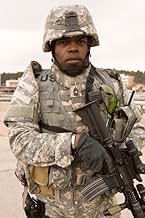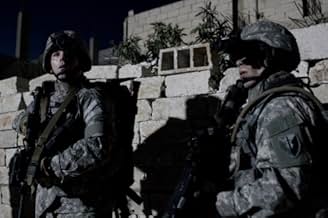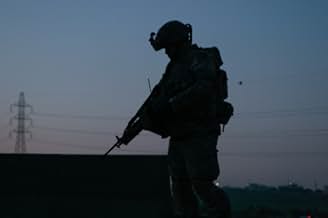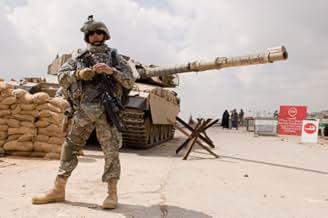NOTE IMDb
6,1/10
12 k
MA NOTE
La reconstitution dévastatrice du viol et du meurtre d'une jeune irakienne de 15 ans par des soldats américains à Samarra en 2006.La reconstitution dévastatrice du viol et du meurtre d'une jeune irakienne de 15 ans par des soldats américains à Samarra en 2006.La reconstitution dévastatrice du viol et du meurtre d'une jeune irakienne de 15 ans par des soldats américains à Samarra en 2006.
- Récompenses
- 6 victoires et 2 nominations au total
Anas Wellman
- Soldier
- (as Anas 'Tipsy' Wellman)
Happy Anderson
- Battalion Commander
- (as Eric 'Happy' Anderson)
- …
Avis à la une
Redacted (2007)
* 1/2 (out of 4)
U.S. soldiers working at a checkpoint in Iraq see a 15-year-old girl, which gets them hard so they eventually rape her, murder her and her family and then set them on fire. It's really hard to judge this movie because on one hand it's pretty well made but that's no excuse for the propaganda coming at you every single second of the film. There's no question this is an anti-Iraq movie made by anti-Iraq people and that's why we see the things we do. Every negative heard about American troops is on display here, which is why this film is so one sided and why I couldn't enjoy the movie. I don't give a rats butt what ones opinion on the war is but a movie needs to be open and look at all sides of an issue but this is just like a Michael Moore film as we see one side and that's the side of the director and not necessarily a side with all facts. The American soldiers are all show as crazy, raping idiots who would probably be too stupid to have a job if they weren't in the Army. Is this a good way to show troops? The Iraqi people are shown as innocent victims yet we never see the ones going around blowing innocent people up. Wait a minute, we actually do in the film when one soldier has his head cut off but the film shows this as the right thing to do to the soldier. I could go on and on about this political propaganda in this film but the actually rape case is something DePalma did before with his Vietnam film Casualties of War. The film taking one incident and trying to show it as everyday stuff is just as crazy as The Birth of a Nation. I think it would be fair to say that De Palma has lost a lot of his talent over the past few decades and it's getting harder and harder to get a good film from him. I'll end my review on this last opinion. I find it funny that celebs in Hollywood think they can bring peace to the world, end hunger, magically make dueling sides like one another and rebuild a community yet they can't even make a good movie. Perhaps it's just me but if they can't even make good films or pick a good screenplay then how in the hell are they going to have the brains to do something bigger?
* 1/2 (out of 4)
U.S. soldiers working at a checkpoint in Iraq see a 15-year-old girl, which gets them hard so they eventually rape her, murder her and her family and then set them on fire. It's really hard to judge this movie because on one hand it's pretty well made but that's no excuse for the propaganda coming at you every single second of the film. There's no question this is an anti-Iraq movie made by anti-Iraq people and that's why we see the things we do. Every negative heard about American troops is on display here, which is why this film is so one sided and why I couldn't enjoy the movie. I don't give a rats butt what ones opinion on the war is but a movie needs to be open and look at all sides of an issue but this is just like a Michael Moore film as we see one side and that's the side of the director and not necessarily a side with all facts. The American soldiers are all show as crazy, raping idiots who would probably be too stupid to have a job if they weren't in the Army. Is this a good way to show troops? The Iraqi people are shown as innocent victims yet we never see the ones going around blowing innocent people up. Wait a minute, we actually do in the film when one soldier has his head cut off but the film shows this as the right thing to do to the soldier. I could go on and on about this political propaganda in this film but the actually rape case is something DePalma did before with his Vietnam film Casualties of War. The film taking one incident and trying to show it as everyday stuff is just as crazy as The Birth of a Nation. I think it would be fair to say that De Palma has lost a lot of his talent over the past few decades and it's getting harder and harder to get a good film from him. I'll end my review on this last opinion. I find it funny that celebs in Hollywood think they can bring peace to the world, end hunger, magically make dueling sides like one another and rebuild a community yet they can't even make a good movie. Perhaps it's just me but if they can't even make good films or pick a good screenplay then how in the hell are they going to have the brains to do something bigger?
Despite the many criticisms by others on this site, Redacted is a compelling film based on an actual incident that occurred in Baghdad in 2006. Yes, the acting leaves something to be desired, the 'mixed-media' approach is distracting, and there are some manipulative moments (the beheading, the final still); But this is still an eye-opening film on the state of events in Iraq and the trials that *both* Iraqis and Americans have to deal with daily. The scenes at the checkpoint are particularly well done. Some of the dialog between the soldiers in the unit is compelling in its own way; Similarly so the scenes with the Iraqi reporters and 'embeds.'
I've seen all the recent films about Iraq ('Valley of Elah', 'Lions for Lambs', 'Rendition' ) and think that 'Redacted' provides insights none of the others do. In particular, it does an excellent job illustrating the clash between the respective cultures of Iraq and America. (50% of Iraqis can't read the signs at US checkpoints!)
Is this film a bit of an unholy mess? Yes, but see it anyway and make your own mind up. I think this one deserves at least a 6 out of 10.
I've seen all the recent films about Iraq ('Valley of Elah', 'Lions for Lambs', 'Rendition' ) and think that 'Redacted' provides insights none of the others do. In particular, it does an excellent job illustrating the clash between the respective cultures of Iraq and America. (50% of Iraqis can't read the signs at US checkpoints!)
Is this film a bit of an unholy mess? Yes, but see it anyway and make your own mind up. I think this one deserves at least a 6 out of 10.
The thing we know for sure about de Palma is that there are no accidental or unintentional images, cuts, camera angles or words in his movies. What looks rough was intended to look rough. What looks like a careless frame was there to look careless. This film, like "Hi Mom" & "Greetings" (and even "Get to Know Your Rabbit) is not part of the Hollywood so many "reviewers" leaving their drivel in IMDb (aka the un-united statesmen) are either railing against or rallying behind.
As far as I could tell, this was a look at the world through De Palma's own Snake-eyes - via a camera, and a script HE wrote. It doesn't take a rocket scientist to know that a view of the world from his camera will not look like anybody else's, and most surely won't be subject to anybody else's rules or political agenda.
Back in the day when Martin Scorsese made "The Last Temptation of Christ," I got cornered next to a conversation of religious conservatives who were ranting about the "Jews who control of Hollywood" being behind Scorsese's film. I had to laugh -- and did. They all turned to look at me like I was next in line for the noose -- and so I pointed out that Scorsese was New York Italian Catholic -- and had contemplated the priesthood. And that he'd made so much money and reputation points for studios that no studio, executive, or other influencing body could or would try to influence or control the content of his films.
So again, there's a laugh here if you think De Palma is the tool of any studio, influential group, or left-wing agenda. The truth is, each filmmaker has a point of view that is their own - - or at least the ones who make the films we want to see.
And -- if you think Hollywood -- that herd of cats who make the entertainment which may well be our last exportable natural resource -- is wrangled into the lock-step of an agenda other than making money and making entertainment, then you've obviously never met a writer, an actor, a musician, an artist, a computer nerd, a designer, a makeup artist, a stunt coordinator, or an agent. As a group, the only thing they have in common is lust for MAKING. Individually -- their beliefs are as varied as Tom Cruise and Tom Waits. And their personal agendas may sometimes reach the light in the projector -- or the flash of paparazzi cameras -- or the blare of a talk show microphone.
But the statements made in these point-of-view films are artworks giving voice and image to the mind of the artist. Like Guerneca, Rhapsody in Blue, or Oliver Twist -- art is not just entertainment, beauty, or cleverness -- it is the expression of a personal agenda by its very nature. Artists are meliorists. They believe they can, and that they have the right, to change the world.
so get over yourselves. It's not a plot. It's free speech. And Brian De Palma has always been enamored of not so much speaking his mind -- as filming his mind.
As far as I could tell, this was a look at the world through De Palma's own Snake-eyes - via a camera, and a script HE wrote. It doesn't take a rocket scientist to know that a view of the world from his camera will not look like anybody else's, and most surely won't be subject to anybody else's rules or political agenda.
Back in the day when Martin Scorsese made "The Last Temptation of Christ," I got cornered next to a conversation of religious conservatives who were ranting about the "Jews who control of Hollywood" being behind Scorsese's film. I had to laugh -- and did. They all turned to look at me like I was next in line for the noose -- and so I pointed out that Scorsese was New York Italian Catholic -- and had contemplated the priesthood. And that he'd made so much money and reputation points for studios that no studio, executive, or other influencing body could or would try to influence or control the content of his films.
So again, there's a laugh here if you think De Palma is the tool of any studio, influential group, or left-wing agenda. The truth is, each filmmaker has a point of view that is their own - - or at least the ones who make the films we want to see.
And -- if you think Hollywood -- that herd of cats who make the entertainment which may well be our last exportable natural resource -- is wrangled into the lock-step of an agenda other than making money and making entertainment, then you've obviously never met a writer, an actor, a musician, an artist, a computer nerd, a designer, a makeup artist, a stunt coordinator, or an agent. As a group, the only thing they have in common is lust for MAKING. Individually -- their beliefs are as varied as Tom Cruise and Tom Waits. And their personal agendas may sometimes reach the light in the projector -- or the flash of paparazzi cameras -- or the blare of a talk show microphone.
But the statements made in these point-of-view films are artworks giving voice and image to the mind of the artist. Like Guerneca, Rhapsody in Blue, or Oliver Twist -- art is not just entertainment, beauty, or cleverness -- it is the expression of a personal agenda by its very nature. Artists are meliorists. They believe they can, and that they have the right, to change the world.
so get over yourselves. It's not a plot. It's free speech. And Brian De Palma has always been enamored of not so much speaking his mind -- as filming his mind.
Brian de Palma's Redacted ups the ante of protest films, fictionally recounting the rape and murder of a 14-year old Iraqi girl by U.S. soldiers in 2006. Using hand-held camera surveillance footage, Internet videos, excerpts from a French documentary and an Arab TV channel, Islamic fundamentalist websites, and the fictional camcorder diary of a young U.S. private, Redacted lets us know not only about the atrocities of war but about the unreliability of the way in which information is presented in the media and how we cannot trust what we see, even in his film.
Modeled after de Palma's earlier Casualties of War, Redacted searches for a truth in fiction that is deeper than reality-based documentary. Angel Salazar (Izzy Diaz) carries a video camera around shooting whatever he sees hoping to make a documentary that will be his ticket to film school. We are first introduced to his unit: Gabe Blix (Kel O'Neil), Lawyer McCoy (Rob Devaney), Sergeant Jim Sweet (Ty Jones) and good ol' boys, Reno Flake (Patrick Carroll) and B.B. Rush (Daniel Stewart Sherman). The videos make it apparent that our soldiers have lost their sense of purpose and are no longer on solid emotional ground.
The hand held video camera is then replaced by a French documentary about the soldier's routine at checkpoints in Samarra. Suddenly, a speeding car is approaching. Interpreting the signals by U.S. personnel to slow down as meaning they are being waved on through, the car is gunned down, killing a pregnant woman and her unborn child as the driver After a member of Salazar's unit is killed by a bomb, the two men who fired on the speeding car, Rush and Flake, invade the home of an Iraqi family in retribution and to enjoy the "spoils of war". In the middle of the night, they rape and murder a fourteen-year old girl, kill her family, and set the house on fire.
The sensitive Blix does not want to be involved with the mission, and McCoy goes along to try and prevent more harm but fails to stop the violence. Flake and Rush tell the rest of the company that any word of this incident will result in their death. The incident is seen only with a flickering light and the actual assault takes place off camera, but the scene nonetheless elicits a feeling of disgust. As if to try and show that the horrors of war are not limited to one side, de Palma shows the abduction and beheading of a U.S. soldier in very graphic terms. In the final gut wrenching sequence, a montage labeled "Collateral Damage" brings truth and fiction together as we see actual footage of Iraqi war victims mixed with staged deaths and faces that are redacted with black pens.
While Redacted is flawed by inconsistent acting and overly didactic add-ons, its impact is extremely powerful. De Palma indicts both the stupidity of the U.S. government for initiating the war, the complicity of the media in presenting us with a sanitized version of it, and a culture in which such atrocities are permitted to occur. Like the films of French director Bruno Dumont that show how meaningless violence generates more meaningless violence, the visceral impact of Redacted will stay with you for a long time. Slapping us in the face to show us how we have lost touch with the reality of war, the film is full of elemental passion, untidy, disjointed, and at times over-the-top, but in Dumont's words, it returns us "to the body, to the heart, to truth".
Modeled after de Palma's earlier Casualties of War, Redacted searches for a truth in fiction that is deeper than reality-based documentary. Angel Salazar (Izzy Diaz) carries a video camera around shooting whatever he sees hoping to make a documentary that will be his ticket to film school. We are first introduced to his unit: Gabe Blix (Kel O'Neil), Lawyer McCoy (Rob Devaney), Sergeant Jim Sweet (Ty Jones) and good ol' boys, Reno Flake (Patrick Carroll) and B.B. Rush (Daniel Stewart Sherman). The videos make it apparent that our soldiers have lost their sense of purpose and are no longer on solid emotional ground.
The hand held video camera is then replaced by a French documentary about the soldier's routine at checkpoints in Samarra. Suddenly, a speeding car is approaching. Interpreting the signals by U.S. personnel to slow down as meaning they are being waved on through, the car is gunned down, killing a pregnant woman and her unborn child as the driver After a member of Salazar's unit is killed by a bomb, the two men who fired on the speeding car, Rush and Flake, invade the home of an Iraqi family in retribution and to enjoy the "spoils of war". In the middle of the night, they rape and murder a fourteen-year old girl, kill her family, and set the house on fire.
The sensitive Blix does not want to be involved with the mission, and McCoy goes along to try and prevent more harm but fails to stop the violence. Flake and Rush tell the rest of the company that any word of this incident will result in their death. The incident is seen only with a flickering light and the actual assault takes place off camera, but the scene nonetheless elicits a feeling of disgust. As if to try and show that the horrors of war are not limited to one side, de Palma shows the abduction and beheading of a U.S. soldier in very graphic terms. In the final gut wrenching sequence, a montage labeled "Collateral Damage" brings truth and fiction together as we see actual footage of Iraqi war victims mixed with staged deaths and faces that are redacted with black pens.
While Redacted is flawed by inconsistent acting and overly didactic add-ons, its impact is extremely powerful. De Palma indicts both the stupidity of the U.S. government for initiating the war, the complicity of the media in presenting us with a sanitized version of it, and a culture in which such atrocities are permitted to occur. Like the films of French director Bruno Dumont that show how meaningless violence generates more meaningless violence, the visceral impact of Redacted will stay with you for a long time. Slapping us in the face to show us how we have lost touch with the reality of war, the film is full of elemental passion, untidy, disjointed, and at times over-the-top, but in Dumont's words, it returns us "to the body, to the heart, to truth".
"Redacted" is a shattering, powerful experience. It has been criticized by some as painful to watch...but I think that is the point entirely.
For too long, Americans have been spoon-fed a steady diet of lies about the Iraq War (not least about why we invaded that nation in the first place).
De Palma aims to shows us another side to this terrible conflict; one that we won't get on Fox News (or any of the other corporate propaganda networks). It's about time Americans got another point of view on Iraq, because we're hopelessly misinformed about what's going on there (an astonishing number of Americans including a majority of Fox News viewers STILL believe to this day that Saddam was behind 9/11). My friends in Europe don't believe me when I tell them this.
Incidentally, I don't think a film has to be pleasant to watch to be a memorable cinema experience. For example, Fassbinder never made a "entertaining" film, and yet his movies are among the most powerful in all of cinema.
The Iraq War is a horror story of untold magnitude. This film aims to capture the nightmare of the ever-shifting, chaotic Iraq battlefield. It's a film that will be hated, in knee-jerk fashion, by the Bush worshiping nut-case right-wing fringe. But for the rest of us, it's a must-see, powerful and brave film.
For too long, Americans have been spoon-fed a steady diet of lies about the Iraq War (not least about why we invaded that nation in the first place).
De Palma aims to shows us another side to this terrible conflict; one that we won't get on Fox News (or any of the other corporate propaganda networks). It's about time Americans got another point of view on Iraq, because we're hopelessly misinformed about what's going on there (an astonishing number of Americans including a majority of Fox News viewers STILL believe to this day that Saddam was behind 9/11). My friends in Europe don't believe me when I tell them this.
Incidentally, I don't think a film has to be pleasant to watch to be a memorable cinema experience. For example, Fassbinder never made a "entertaining" film, and yet his movies are among the most powerful in all of cinema.
The Iraq War is a horror story of untold magnitude. This film aims to capture the nightmare of the ever-shifting, chaotic Iraq battlefield. It's a film that will be hated, in knee-jerk fashion, by the Bush worshiping nut-case right-wing fringe. But for the rest of us, it's a must-see, powerful and brave film.
Le saviez-vous
- AnecdotesThe scene where Salazar is smiling as he films a scorpion being devoured by ants is an homage to the beginning of Sam Peckinpah's The Wild Bunch (1969) where a group of children gleefully watch scorpions being eaten by ants .
- GaffesIn one scene, PFC Reno Flake refers to SPC Lawyer McCoy as a "Corporal" when in fact his rank is that of Specialist.
Meilleurs choix
Connectez-vous pour évaluer et suivre la liste de favoris afin de recevoir des recommandations personnalisées
- How long is Redacted?Alimenté par Alexa
Détails
- Date de sortie
- Pays d’origine
- Sites officiels
- Langues
- Aussi connu sous le nom de
- Örtülü gerçek
- Lieux de tournage
- Sociétés de production
- Voir plus de crédits d'entreprise sur IMDbPro
Box-office
- Budget
- 5 000 000 $US (estimé)
- Montant brut aux États-Unis et au Canada
- 65 388 $US
- Week-end de sortie aux États-Unis et au Canada
- 25 628 $US
- 18 nov. 2007
- Montant brut mondial
- 784 604 $US
- Durée
- 1h 30min(90 min)
- Couleur
- Mixage
- Rapport de forme
- 1.85 : 1
Contribuer à cette page
Suggérer une modification ou ajouter du contenu manquant





























